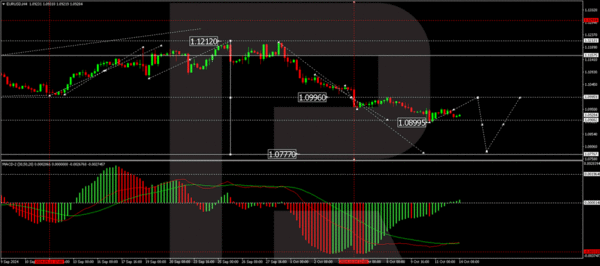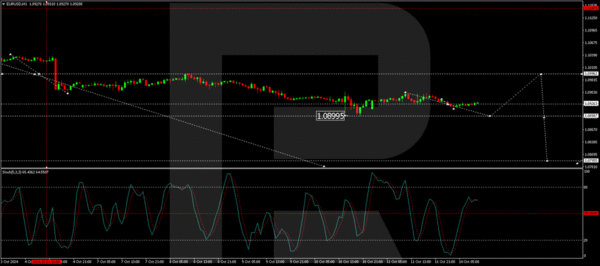EUR/USD has seen a slight downturn, correcting near the support level of 1.0905 as the market adjusts its expectations regarding the Federal Reserve’s monetary policy. The probability of a 25-basis-point rate cut by the Fed in November currently stands at 86.8%, reflecting a cautious outlook for significant further easing this year.
Economic data from Germany showed a current account surplus of 14.4 billion euros in August 2024, marking the smallest surplus since May 2023 and falling short of analysts’ expectations of 19.9 billion euros. This decrease was most notable in the goods segment, highlighting potential vulnerabilities in Europe’s largest economy.
In the US, the University of Michigan’s preliminary Consumer Confidence Index for October dropped to 68.9 points from 70.1 in September, a five-month high. This decline was contrary to expectations of an increase to 71.9 points. The year-on-year comparison also illustrates consumer concerns about high prices, as the index has risen from 63.8 in October 2023.
Technical analysis of EUR/USD
The EUR/USD pair has completed a downward movement to 1.0890, followed by a growth impulse to 1.0953 and a correction to 1.0926. A consolidation range is now forming around 1.0926. A break below this range could extend the decline to 1.0898. Conversely, an upward break could initiate a corrective move to 1.0995, potentially followed by another downward wave towards 1.0777. The MACD indicator supports this scenario, as it is below zero but starting to show signs of upward movement, indicating the potential for short-term bullish corrections within a broader bearish trend.
On the hourly chart, after achieving a high of 1.0953, the market underwent a correction to 1.0925. It has since broken below 1.0926, indicating a possible extension of the consolidation range towards 1.0898. Upon reaching this level, a retest of 1.0926 from below might occur, followed by a corrective rise to 1.0995. The Stochastic oscillator, positioned above 50 and poised to drop towards 20, suggests that short-term declines may occur before any potential recovery.


